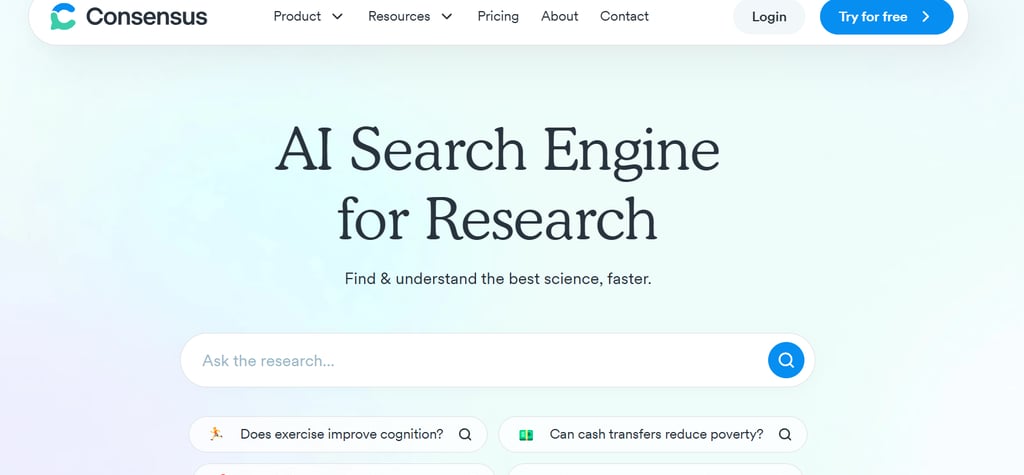7 AI Research Tools Revolutionizing Academic Writing in 2025
4/14/20254 min read


AI tools are reshaping academic workflows, offering researchers and students unprecedented efficiency in literature reviews, data analysis, and manuscript preparation. Below are seven cutting-edge tools bridging the gap between raw research and publication-ready work.
Top 7 AI Tools for Academic Writing
1. Consensus
Best for: Instant literature reviews.
No more endless scrolling—ask a question and get AI-powered summaries of top articles.
Searches 200 M+ peer-reviewed papers using natural language queries
"Consensus Meter" visualizes agreement levels across studies 1
Pricing: Free (20 AI credits/month); Premium ($8.99/month)
Consensus is an AI tool that tackles the overwhelming challenge of sifting through millions of academic studies. Instead of drowning users in endless PDFs, it acts like a research assistant on steroids—digging through 200+ million papers to deliver clear, evidence-backed answers to questions like “Does meditation reduce stress?” or “Are electric vehicles eco-friendly?” Its standout feature, the Consensus Meter, acts as a “vibe check” for science, showing whether studies mostly agree or still debate a topic.
Perfect for researchers, students, journalists, or even curious night-owl Googlers, it turns days of lit reviews into seconds. Free tier users get 20 queries monthly, while a Premium subscription ($8.99/month) covers heavier needs. Though not a replacement for deep dives into primary sources, it’s a game-changer for cutting through noise and finding trusted science fast—no lab coat required.
Ready to try it? You can explore Consensus here.
(Full transparency: Using this link supports my work at no extra cost to you!)
2. Scite.ai
Best for: Citation context analysis
Scite.ai shows whether a paper’s claims hold up—critical for literature reviews.
Classifies 1.2B+ citations as supporting/contrasting/mentioning
Flags retracted papers in real-time 18
Pricing: $20/month (Individual); Custom team plans
Scite.ai represents a groundbreaking approach to academic literature evaluation, fundamentally transforming how researchers assess the reliability and impact of scientific papers. Unlike traditional citation metrics that merely count references, Scite.ai delves deeper by analyzing the context and nature of citations across the scientific literature.
At its core, Scite.ai addresses a critical gap in research methodology: understanding how subsequent studies have treated a paper's findings. The platform has developed a sophisticated system that examines over 1.2 billion citations and classifies them into three crucial categories—supporting, contrasting, or simply mentioning. This nuanced classification provides researchers with invaluable insight into whether a paper's claims have been substantiated, challenged, or merely referenced by the broader scientific community.
One of the platform's most significant contributions to research integrity is its real-time retraction flagging system. In an era where research retractions can easily go unnoticed, Scite.ai alerts users when papers have been withdrawn from the scientific record, helping prevent the perpetuation of invalidated findings. This feature serves as a crucial safeguard against the inadvertent use of discredited research.
The practical applications of Scite.ai extend across the research ecosystem. For academics conducting literature reviews, the platform transforms the traditionally laborious process of citation analysis into a streamlined experience, allowing researchers to quickly identify the most robust findings in their field. Graduate students can more confidently navigate unfamiliar research territories by understanding which papers have stood up to scientific scrutiny. Journal editors and peer reviewers gain a powerful tool for contextualizing manuscripts within existing literature.
Beyond individual research applications, Scite.ai contributes to the broader goal of scientific self-correction by making citation networks more transparent. By highlighting papers with substantial supporting evidence versus those with significant contradictory findings, the platform helps the scientific community focus attention where consensus is forming or where important disputes remain unresolved.
The pricing structure reflects the platform's professional orientation, with individual subscriptions at $20 per month and customizable team plans for institutional users. This positioning acknowledges the specialized nature of the tool and its value for serious research endeavors rather than casual exploration.
While Scite.ai represents a significant advancement in citation analysis, users should recognize its complementary role in the research process. The platform excels at providing context for how papers have been received by the scientific community, but this quantitative approach should ideally be paired with qualitative assessment of research quality and methodological soundness.
For researchers navigating the increasingly complex landscape of scientific literature, Scite.ai offers an essential compass, pointing toward stronger evidence and flagging potential problems. By transforming citations from simple counts into meaningful indicators of scientific consensus, the platform helps ensure that research builds upon the most reliable foundations available.
3. Paperpal
Best for: STEM manuscript preparation
Trained on 22M+ scholarly articles
Features:
AI Reference Finder (250M+ database)
Submission-readiness checks (30+ criteria)
LaTeX-compatible plagiarism detector
Pricing: Free tier; Prime from $25/month
4. Litmaps
Best for: Visualizing research connections
Features:
Generates citation network maps
Alerts for newly published related works
Pricing: Free for basic use; Teams $9.99/user
5. Eduaide.AI
Best for: Lesson & assignment design
Generates IEP plans, rubrics, and multilingual resources
Creates discussion prompts from research papers 5
Pricing: Free (limited); Pro $8.25/month
6. QuillBot
Best for: Non-native English speakers
Paraphrases technical text without losing meaning
Integrates with Google Docs & Overleaf
Pricing: Free (125 words/use); Premium $99/year
7. Merlin AI
Best for: Non-native English speakers
Integrates ChatGPT-4o, Claude 3.5, and Gemini 1.5
Key features:
Summarizes PDFs/YouTube videos into citations
Generates infographics from data
Pricing: $19/month (all models included)
Comparative Analysis
The Human Edge in AI-Assisted Research
While tools like Paperpal can draft a literature review section, they can’t:
Develop original hypotheses
Contextualize findings within broader theories
Ethically weigh conflicting evidence
As Mushtaq Bilal (University of Southern Denmark) notes: "ChatGPT redefines research, but most academics don’t know how to use it intelligently."
